When I was studying at Vijayawada, the whole world was engulfed in the second world war. The then British Indian Government set up a semi-official department – National War Front – to collect war support funds. The teacher community of Vijayawada was assigned a target of Rs 7000. It was too big a sum for the teachers to collect. With great concern, the teachers discussed the matter in detail as a group to work out a modus operandi to meet the target. Thanks to the discussions, they hit upon a brilliant idea. Every school had a couple of active girl students who could act, sing and dance. The teachers opined that if they could train these children sufficiently, they can stage a ticketed chow-chow programme and gather the funds. It was also planned that they will sell the tickets for the programme on a war footing, the sale commencing a month ahead of the show.
Suitable girls were picked up from the Gandhinagar, Satyanarayanapuram, Governorpet, Kothapet and Arundelpet Municipal Schools. All the selected girls including me, were fairly competent to sing and dance. Active members of the teachers’ group took upon themselves to select appropriate patriotic songs, group songs, dances and a play for the programme. Having completed the identification of the items for the programme, they started training us. The Governorpet Higher Elementary School was the centre for this purpose. We were all assembling there after the school hours and the rehearsals commenced in right earnest with a tabla and harmonium as accompaniments.
The key item for the programme was a short play, ‘Paduka Pattaabhishekam’. Sri Rama was in exile in the forests, in accordance with the dictate of Kaikeyi, his stepmother. Bharata, Rama’s stepbrother goes to Rama to plead for his return to Ayodhya and take the reins of the kingdom. Having failed in his mission, Bharata pleads again with Rama to spare his ‘Padukas’ – so that they could be symbolically placed on the throne to enable Bharata to rule in the name of Rama. This was the episode selected for enactment in our programme. I was selected by the teachers to be Bharata, the central character in the playlet. The role had three songs and three poems to recite in addition to several dialogues. It was a challenge for me.
The teachers spread across the town of Vijayawada in batches and started approaching the moneyed people, big businessmen, and the Zamindars of surrounding areas residing in Vijayawada town. I wish to narrate here in detail an interesting aspect. Zamindars from places like Nuzvid had their offices and modest residences at Vijayawada as well. And at Madras they had real palaces. This set of affluent and benevolent personalities were the first people chosen by the teachers’ groups. They approached the Zamindars and requested them to be patrons for the programme. They all readily agreed and contributed generously in the form of buying higher denomination tickets. Having been concerned with the world War going around, they never hesitated in contributing for the cause.
We performed at ‘Durga Kala Mandiram’ in the heart of Vijayawada town. Zamindar of Mirjapur Sri Rangarayanam garu was one of patrons who attended the programme. After a few items our playlet – Paduka Pattabhishekam was enacted. I was in full flow with my performance. I was delivering my dialogues and singing songs and poems without any hesitation or inhibition. All my classmates and teachers were full of praise for me.
We came to know that the Zamindar of Mirjapur was highly impressed with my performance as Bharata. He was already a veteran producer of 4-5 films. Those films were produced under the banner – ‘Jaya Films’. For some reason, he changed the name of the banner to Shobhanachala Pictures. Dakshayagnam, a movie produced under the new banner was running successfully across the Andhra Region. The booklet of songs of the movie had an announcement on its back cover that Bhakta Prahlada would be the next production from Sobhanachala Pictures.
While all the children of the Kurmayya hostel were fondly sharing the details of Daksha Yagnam, which they saw on the previous day, we had news that Raja of Mirjapur sent a word to Sri Kurmayya to bring me to him. Accordingly, Sri Kurmayya led me to the Raja’s place. We were told that I was selected for the role of Prahlada in the next production of Sobhanachala Pictures. Sri Kurmayya was amazed and happy to hear about that. I was on cloud nine.
Sri Kurmayya immediately sent a word to our parents at Bandarugudem through a messenger. My father was a bit reluctant to let me discontinue my studies and join the movies. He flatly refused to permit. Hearing this, Sri Kurmayya sent his younger brother, Tirumala Rao to our village, who accompanied my parents to Bezwada for further discussion on the matter. Sri Kurmayya took all the pains to convince my father. Through a couple of elders trusted by my father, Sri Kurmayya tried to convince that I will be put back into my regular studies once the movie work was over. With a strict condition that this would be one-movie affair and I shall come back to my studies after completion of the movie work at Madras, my father finally relented.
* * *
Myself along with my father arrived at Madras after four days. We met Sri Chitrapu Narayana Murthy, the director of the movie. He explained the details of agreement we were required to enter into with the film production company. We agreed upon a salary of 100 rupees a month.
We took a small portion on rent from a Tamil landlord at Teynampet. The facilities were very basic, yet we managed to settle there.
I was told that I would be playing the younger Prahlada’s role in the movie which would only run till the interval. Thereafter, G Varalakshmi would be playing the elder Prahlada’s role. She was already an established child artist in the movie field. She was initially offered the Prahlada’s role for the entire length of the movie. Having seen me at Bezwada, the Raja decided to split the role into two parts.
Despite the split in the role, Varalakshmi took a liking for me in the very first meeting and started treating me as her younger sibling. Besides being affectionate and kind to me, she was respectful towards my father as well. She didn’t like our Teynampet rented house. She immediately shifted us to her tiled house at Alwarpet and allotted a large room for us. She already had a Nair boy to take care of the kitchen. He used to serve delicious food to us.
Those were the days when youngsters from Andhra region were attracted by the movies and started thronging into Madras for opportunities in the movies. Most of them were not successful in getting a foothold in the movie field. Having depleted of the meagre funds they carried from home, they were going around the studios on empty stomachs. Having known the generosity of Varalakshmi, they used to approach her for shelter and food. She accommodated most of those youngsters. As a result, her house was having row after row of guests for a meal. Nair boy was patiently meeting this requirement and was busy cooking for long hours. However, mine was a different case. I was a special guest for Varalakshmi. She used to sit me beside her and made me eat along with her. She seldom spared me to have meals with my father. Hers was an affection which was deeper than that of a sibling.
It took six months to complete the movie, Prahlada in the year 1941. Sri Vemuri Gaggayya, a very famous stage and movie artist enacted the role of Hiranya Kashyapa. Smt Chadalavada Rajeswari was in the role of Leelavati. Sri Malladi Ramakrishna Sastry, a native of Guntur and famous as a stage artist by then, was given the role of Narada. Sri Kumpatla Subba Rao and Rangoon Rama Rao were in the roles of Chandamarka.
I was showered with care and affection by the entire crew of the movie during the shooting. Having already been acquainted with performing on the stage with songs and poems I had no inhibitions in doing the same in front of a camera. Sri Motilal was a regular music director of that production company. He was the music director for this movie too. Playback singing system was not vogue at that time. Actors were expected to sing while acting and the same was recorded live. We had very few re-takes, probably because the raw film was in short supply during the war days.
The music director made all of us to rehearse the songs along with the orchestra. Sri Galipenchala Narasimha Rao was tutoring in respect of the poems. We used to go to his residence at Teynampet everyday for this purpose.
Sri Chitrapu Narayana Murthy, despite being a famous movie director by then, was a simple man. He was very cordial to the entire crew; unmindful to the fact that they were performing a major role or a minor one. In my case, he was affection personified.
On completion of the movie work, before we commenced our journey home, myself and father met our director. In the process of thanking the director, my father had tears in his eyes. To the best of my knowledge, that was the only occasion when he melted that way. Even in later life, despite facing innumerable family problems, he was never in tears. He was a very balanced and composed person.
The Alwarpet house of Varalakshmi, was located in the middle of a large plot. It was a five roomed tiled house. In addition, she had her mother, sister, elder brother and two younger brothers staying with her. They were originally from Guntur. They belonged to the Kapu community and their surname Gaddam was well-reputed. Varalakshmi’s mother was a bit orthodox and was extremely particular about the caste hierarchy. She never liked the idea of Varalakshmi accommodating me and my father at her house. In addition, Varalakshmi was more affectionate towards me than towards her own sister, Venkata Ratnam. This was rather unbearable for the mother. She was also deeply concerned that Varalakshmi was dining along with me every day, disregarding the caste barrier. All these factors led to friction between mother and daughter. Being a sensitive person, father noticed this and decided to shift to another building nearby. Even after departing from her house, Varalakshmi was taking care of my requirements.
* * *
The new portion we occupied was in a two storied building. We took a room in the ground floor. Sri Relangi Venkata Ramayya along with two of his friends was occupying the two-roomed portion on the upper floor. One of the two friends was Sri Chalapati Rao from Nuzvid. Other one was Sri Narayana Rao from West Godavari district. Sri Relangi already became a member of the group of disciples of Sri P Pullayya, a famous director of the time. Sri Relangi was an emerging comedian and was reputed to have a bright future.
Sri Chalapati Rao was a veena wizard. He was engaged in the orchestra as a Veena player for a movie ‘Patni’, that was being directed by Sri Gudavalli Ramabraham. Master Saluri Rajeswara Rao, not yet 20 by then, was the music director. Sri Chalapati Rao enthusiastically narrated how talented Rajeswara Rao was, and how he was composing extremely melodious music for the movie.
Besides being a baby among this group, as I was playing a major role in Prahlada movie, I received their attention, love and affection. They in fact, used to pamper me. While Sri Chalapati Rao was practising music every morning, Sri Relangi used to join him to get trained in singing Kritis and Varnas. Relangi used to insist that I should also join them and learn music. I had a golden opportunity of being with those stalwarts for about two months engaged in the practice of classical music.
I still remember a Varnam and a Kriti which I was practising in 1941. (Varnam – manasa sancharare; Kriti – Bagu meeraganu naato palakaga raadaa…)
Sri Relangi who was an upcoming comedian at that time, rose to be the chief comedian in social and folklore movies in a span of four years. He soon became the darling of the masses and he gave a consummate performance in the movie ‘Peddamanushulu’ of the early 1950s.
* * *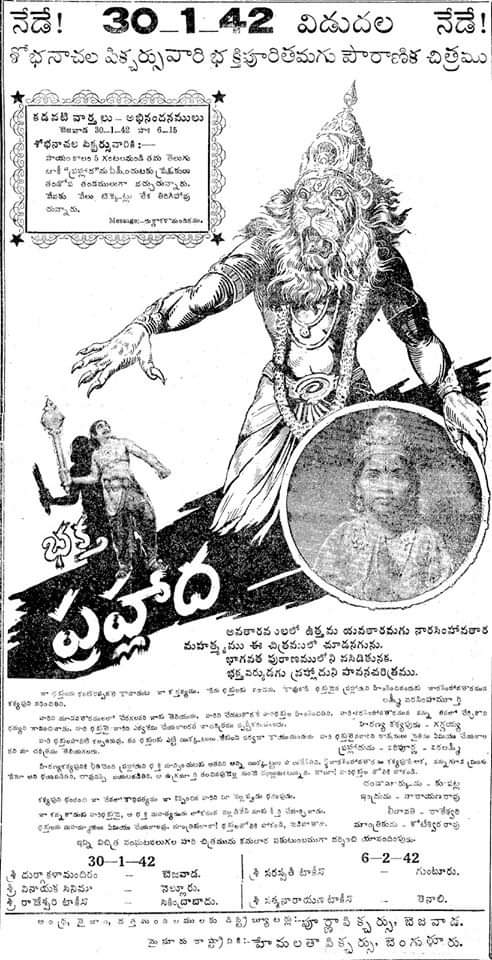
A month before the completion of Prahlada, a gentleman who was playing a minor role in the movie convinced my father that I will have a brilliant future in the movie field and made both of us go along with him and request Sri Gudavalli Ramabrahmam for a role. Sri Ramabrahmam was directing ‘Patni’ at that time. It was eight O’ clock late in the evening. The well-wisher who took us along to Sri Ramabrahmam pleaded on our behalf, “sir, this girl, Paripurna, is playing the role of Prahlada in Sobhanachala’s production. The movie will be completed in a month. She can sing extremely well. I understand you have a minor role that suits Paripurna. I request you to consider and accommodate Paripurna in that role”.
Sri Ramabrahmam listened to us attentively, greeted me with affection and made me sit beside him. “I am happy that you got a good opportunity in a movie at this very young age. Have you seen any of the movies like Malapilla, Raitubidda and Vande Mataram? Did you like them?” he enquired with a smile.
“Yes sir, not once, but twice. My elder brother liked them immensely and took all of us more than once. We all liked those movies,” I replied with great enthusiasm. He was very pleased. However, he was a little pained to say “it would have been wonderful had you met me a month back. Yes, I did have a role of a village belle from the hills in this movie. Kamala who is right now sitting there, was recently selected for that role. She sings well. I am sorry. I do not have anything to offer right now.” He said that and patted me affectionately and offered, “please don’t go away immediately. Spend some time and watch the shooting.” He called a light boy and asked him to get us some snacks and coffee.
The shooting I witnessed on that night pertains to a movie based on Silappadigaram – a Tamil classics of the medieval era. Kannagi, the protagonist, who was very rich at one time, loses all her assets and grandeur, and was forced into exile. She ends up in a village by the side of a hill and spends her time in a dilapidated hut, in a pathetic state. The young women around were trying to rise up her spirits by dancing for her. That was the scene being picturised that night.
A dozen women were performing a folk dance with short sticks in hand, which were producing rhythmic sound. The folk song had a catchy beat and it was indeed a song that was reviving the spirits all around. Of course, on the insistence of the dance director, they were playing the same step repeatedly. We watched that proceedings for a while and as father was a bit concerned that we were getting late, he took leave of Sri Ramabrahmam and went back home.
* * *
Master Saluri Rajeswara Rao was the music director for that movie ‘Patni’. He was a child prodigy. He was already well-known for his melodious tunes. I still remember the lyrics of that folk song, well-composed by him.
Kannagi is a character from an iconic Tamil epic of the ancient times. Kovalan, her husband, was a successful merchant. For some reason he loses all his riches and ends up in acute poverty and associated difficulties. Kannagi, stands beside him with courage in those difficult times. Sri Ramabrahmam adapted that epic into a contemporary social drama, ‘Patni’. Srimati Rushyendra Mani and Kovelamudi Prakasha Rao were playing the lead characters in the movie.
During that time, Srimati Pasupuleti Kannamba, Sriranjani (senior), Surabhi Kamala bai, Ramatilakam, Kanchanamala, Lakshmi Rajyam were prominent figures in the Telugu film industry. With their excellent acting prowess and with matching costumes, they were a rage in the Andhra land of that time. There was no need either for them or for the film industry, to resort to titillation in the form of belly dances and skin show to garner popularity. They all excelled purely on the basis of their acting prowess, gained immense popularity and respect and departed with dignity.
*

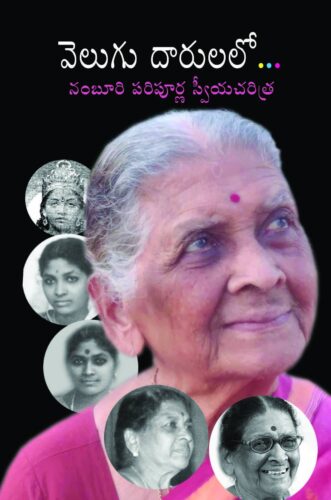


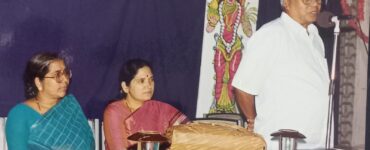
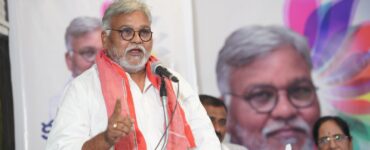

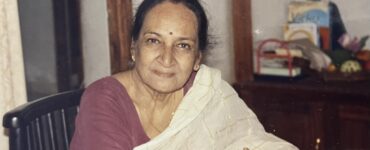

Nostalgic.
Highly illustrative of the South Indian cinema hitherto unknown.
Kudos.
Hers has been an eventful and inspiring life and she represented a never say die spirit. The flowering of her talent started right in her childhood as can be seen in the events described here
Thanks for sharing.
These few pages serve as an appetizer in making one enthusiastic about reading the whole text .
Thanks for sharing.